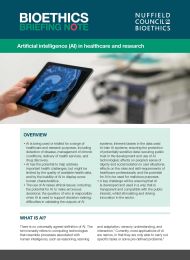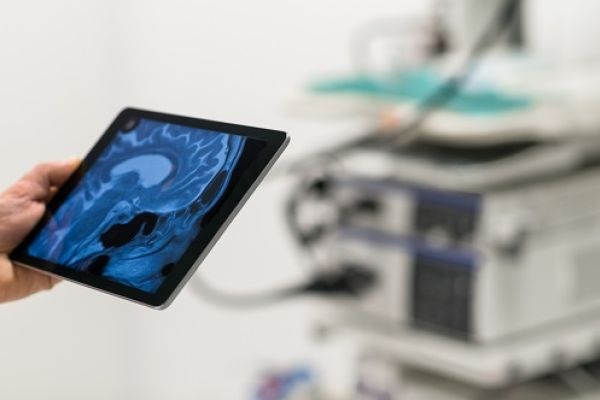Artificial intelligence (AI) in healthcare and research
Policy Briefing
Published 15/05/2018

Applications of AI in healthcare and research
Healthcare organisation
AI has the potential to be used in planning and resource allocation in health and social care services. For example, the IBM Watson Care Manager system is being piloted by Harrow Council with the aim of improving cost efficiency. It matches individuals with a care provider that meets their needs, within their allocated care budget. It also designs individual care plans, and claims to offer insights for more effective use of care management resources.
AI is also being used with the aim of improving patient experience. Alder Hey Children’s Hospital in Liverpool is working with IBM Watson to create a ‘cognitive hospital’, which will include an app to facilitate interactions with patients. The app aims to identify patient anxieties before a visit, provide information on demand, and equip clinicians with information to help them to deliver appropriate treatments.
Medical research
AI can be used to analyse and identify patterns in large and complex datasets faster and more precisely than has previously been possible.* It can also be used to search the scientific literature for relevant studies, and to combine different kinds of data; for example, to aid drug discovery. The Institute of Cancer Research’s canSAR database combines genetic and clinical data from patients with information from scientific research, and uses AI to make predictions about new targets for cancer drugs. Researchers have developed an AI ‘robot scientist’ called Eve which is designed to make the process of drug discovery faster and more economical. AI systems used in healthcare could also be valuable for medical research by helping to match suitable patients to clinical studies.
Clinical care
AI has the potential to aid the diagnosis of disease and is currently being trialled for this purpose in some UK hospitals. Using AI to analyse clinical data, research publications, and professional guidelines could also help to inform decisions about treatment.
Possible uses of AI in clinical care include:
- Medical imaging – medical scans have been systematically collected and stored for some time and are readily available to train AI systems. AI could reduce the cost and time involved in analysing scans, potentially allowing more scans to be taken to better target treatment. AI has shown promising results in detecting conditions such as pneumonia, breast and skin cancers, and eye diseases.
- Echocardiography – the Ultromics system, trialled at John Radcliffe Hospital in Oxford, uses AI to analyse echocardiography scans that detect patterns of heartbeats and diagnose coronary heart disease.
- Screening for neurological conditions – AI tools are being developed that analyse speech patterns to predict psychotic episodes and identify and monitor symptoms of neurological conditions such as Parkinson’s disease.
- Surgery – robotic tools controlled by AI have been used in research to carry out specific tasks in keyhole surgery, such as tying knots to close wounds.
Patient and consumer-facing applications
Several apps that use AI to offer personalised health assessments and home care advice are currently on the market. The app Ada Health Companion uses AI to operate a chat-bot, which combines information about symptoms from the user with other information to offer possible diagnoses. GP at Hand, a similar app developed by Babylon Health, is currently being trialled by a group of NHS surgeries in London.
Information tools or chat-bots driven by AI are being used to help with the management of chronic medical conditions. For example, the Arthritis Virtual Assistant developed by IBM for Arthritis Research UK is learning through interactions with patients to provide personalised information and advice concerning medicines, diet, and exercise.
Government-funded and commercial initiatives are exploring ways in which AI could be used to power robotic systems and apps to support people living at home with conditions such as early stage dementia, potentially reducing demands on human care workers and family carers.**
AI apps that monitor and support patient adherence to prescribed medication and treatment have been trialled with promising results, for example, in patients with tuberculosis. Other tools, such as Sentrian, use AI to analyse information collected by sensors worn by patients at home. The aim is to detect signs of deterioration to enable early intervention and prevent hospital admissions.
Public health
AI has the potential to be used to aid early detection of infectious disease outbreaks and sources of epidemics, such as water contamination. AI has also been used to predict adverse drug reactions, which are estimated to cause up to 6.5 per cent of hospital admissions in the UK.
* See, for example, Leung MKK, et al. (2016) Machine Learning in Genomic Medicine: A Review of Computational Problems and Data Sets Proc IEEE 104: 176-97; Science Magazine (7 July 2017) The AI revolution in science.
**See, for example, https://chiron.org.uk/; University of Portsmouth press release (11 September 2014) Meet Rita, she’ll be taking care of you. However, some question the suggestion that assistive technologies could relieve pressures on women in particular, see: Parks JA (2010) Lifting the burden of women’s care work: should robots replace the “human touch”? Hypatia 25: 100-20.

Share